Why Every Business Needs A Project Management Consultant Today?

Business organizations under increasing pressure to provide projects on schedule, within budget, and to the desired quality standards in the fast-paced, competitive business world of today. From startups to big businesses, the intricacy of projects—from introducing a new product, using new technology, or entering new markets—demand accuracy, coordination, and knowledge. This is where Project Management Consultants (PMCs) really shine.
Project Management Consultants provide specific information, tools, and techniques meant to improve an organization’s capacity for project management. By means of effective use of resources, they generate notable return on investment (ROI), help reduce risks, and offer direction on optimum policies. Using cost reductions, risk reduction, and quantifiable corporate gains, this paper shows why every company today needs a project management consultant.
Understanding Project Management: A Strategic Driver of Success
Project management refers to the disciplined approach of applying specific knowledge, skills, tools, and techniques to deliver unique outcomes that meet defined objectives. It is the methodical coordination of activities, tools, and deadlines to turn a concept into a physical, excellent outcome. Project management guarantees that every effort stays in line with company goals from start to finish, coordinating cross-functional teams, maintaining benchmarks, and guaranteeing flawless communication at all levels, a project manager serves as the cornerstone.
Depending on the type of the task, modern project management combines Agile, JIRA or Waterfall frameworks. It uses approaches to improve processes, raise output, and stimulate creativity. Furthermore, project management nowadays is more dynamic and predictive because to the development of digital technologies and data-driven decision-making, which helps companies to aggressively reduce risks and seize possibilities.
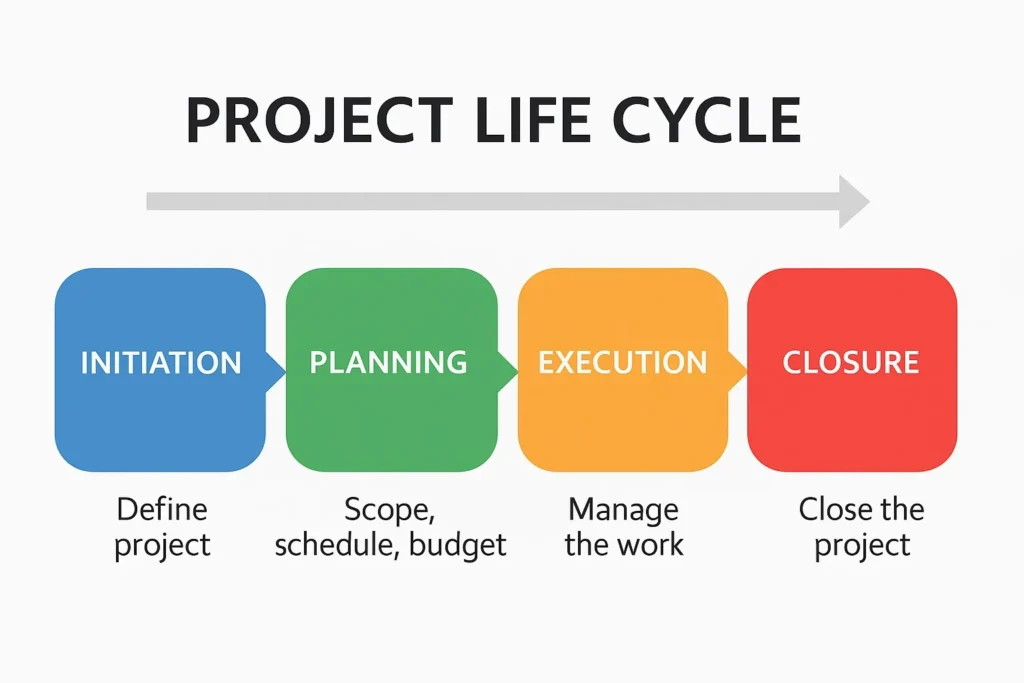
The Role of a Project Management Consultant
Specialized expertise, tools, and approaches brought by a project management consultant guarantees that projects are properly planned, carried out, and delivered. Usually, their main obligations are:
- Developing reasonable and thorough project plans in line with corporate goals calls for careful scheduling and planning.
- Ensuring best use of technical, financial, and human resources helps to optimize them.
- Early identification of possible hazards and development of plans to reduce them constitute part of risk management.
- Establishing and managing project budgets helps to stop overruns.
- Encouragement of timely and clear communication among all project stakeholders helps to strengthen the project.
- Tracking development and guaranteeing constant alignment with project goals by means of key performance indicators (KPIs) helps to monitor performance.
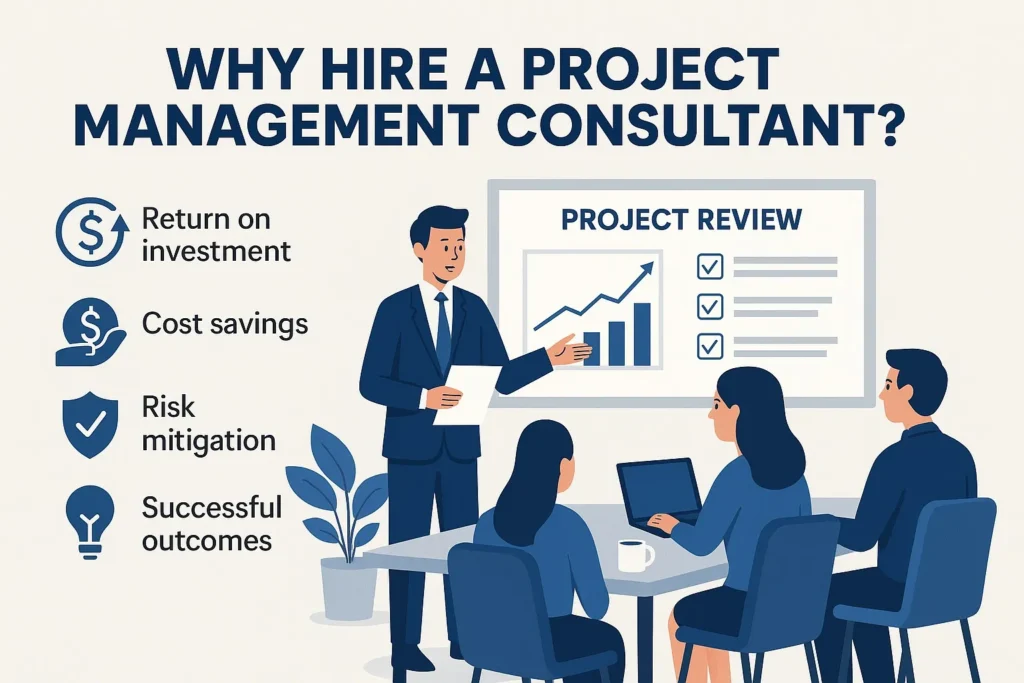
The Value of a Project Management Consultant
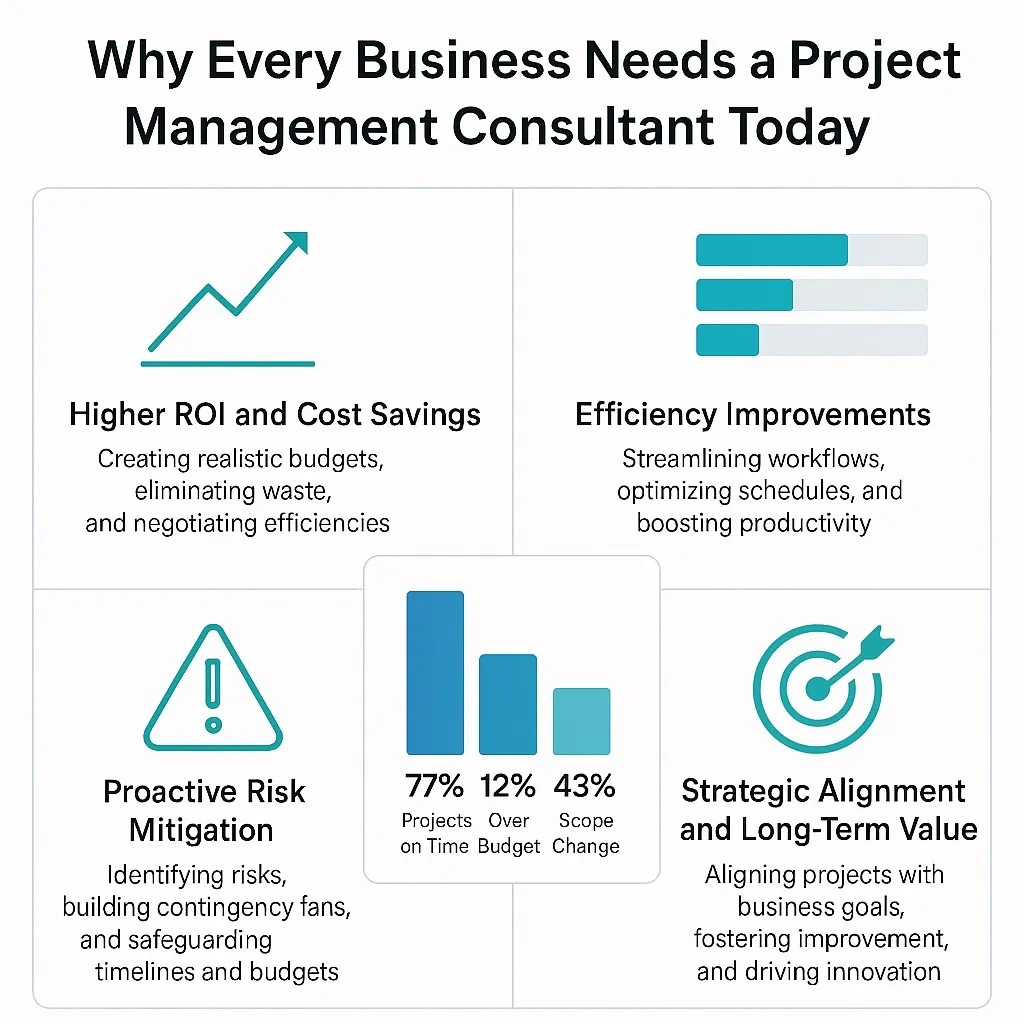
Cost Savings and Return on Investment from Project Management Consulting
The return on investment (ROI) a project management consultant delivers is one of the most convincing arguments for hiring them. Although hiring a consultant could appear like an extra price at first look, over time the financial advantages much exceed the first outlay. Let’s investigate as follows:
Effective Use of the Budget : By developing precise cost estimates and managing spending all through the project life, consultants assist companies minimize unneeded expenses. They are adept in identifying waste of resources, duplicate activities, or inefficiencies causing cost inflation. Their knowledge of vendor management and negotiating usually leads to better deals for products and services required for the project.
Faster Project Delivery : Project delivery delays could cause lost chances, extra expenses, and client discontent. Using time management strategies and best practices, project management experts help to speed project completion without sacrificing quality. Faster time-to the market and faster revenue realization follow from speedier delivery.
Preventing Expensive Errors : Projects gone wrong or badly carried out can cost businesses millions. Early management of scope, quality, and risk helps consultants lower the possibility of expensive project failures. This proactive strategy guards the investments of the company.
Increased Production : Simplifying procedures and waste elimination helps consultants increase team effectiveness. Higher productivity indicates that, without more hiring, the company gains more value from its personnel.
Risk Mitigation: A Strategic Advantage
Every project involves inherent hazards ranging from technical problems and regulatory changes to market volatility and supply chain interruptions. Inadequate risk control can cause even the most well-laid plans to be detailed.
Using disciplined frameworks, project management experts are quite good in foreseeing and reducing risks. Their contributions comprise:
- Risk Identification Workshops: Engaging teams to brainstorm potential risks at the planning stage.
- Risk Registers: Maintaining detailed logs of risks along with mitigation strategies.
- Contingency Planning: Developing fallback strategies to address unforeseen events.
- Change Management: Helping businesses navigate change smoothly, minimizing disruptions.
By systematically managing risks, consultants safeguard the project’s success and protect the organization’s reputation.
Implementation: How to Integrate a Project Management Consultant
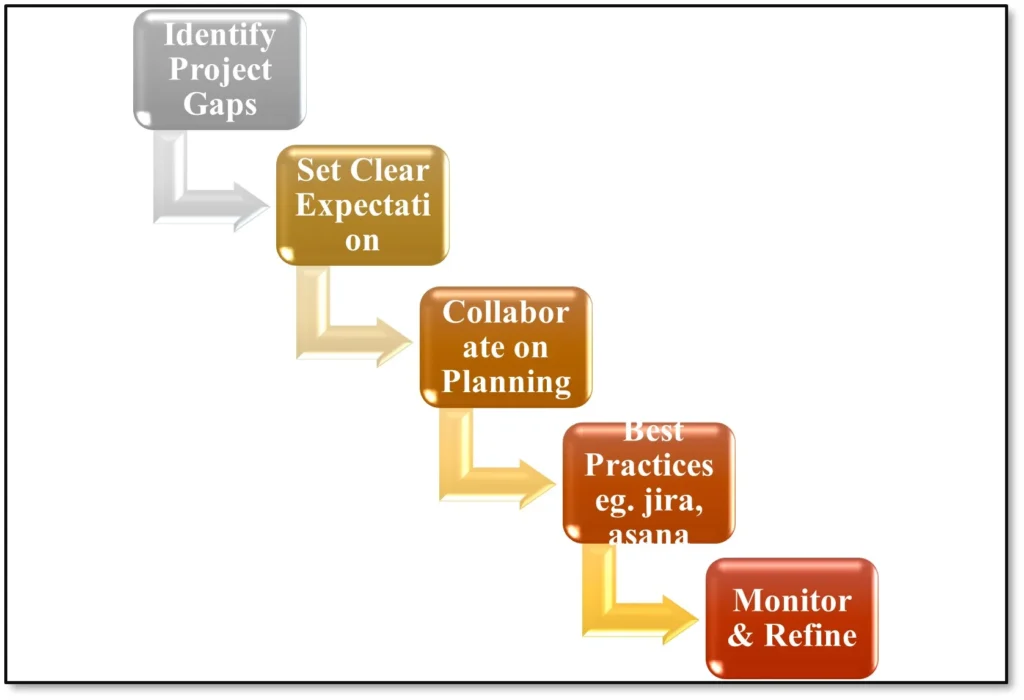
Step 1: Identify Project Gaps
Before hiring a consultant, businesses must assess internal capabilities and pinpoint challenges.
Step 2. Set Clear Expectations
Clearly define what success looks like. Set measurable objectives
Step 3: Collaborate on Planning
The consultant works closely with leadership to:
- Align project goals with business strategy.
- Select suitable methodologies (Agile, Waterfall, PRINCE2, hybrid).
- Design governance and communication frameworks.
Step 4: Roll Out Best Practices
The consultant introduces:
- Project management tools (e.g., MS Project, Jira, Asana).
- Risk management frameworks.
- Reporting dashboards for real-time tracking.
Step 5: Monitor & Refine
Continuous improvement is key. The consultant helps set up post-project reviews and knowledge-sharing sessions so lessons learned can guide future initiatives.
Challenges faced by Project Management Consultants
Project Management Consultants (PMCs) often face challenges such as ambiguous project scope, unrealistic timelines, limited resources, and resistance to organizational change. According to standard company practices, PMCs address these issues through structured planning, detailed scope documentation, and stakeholder alignment meetings. They implement recognized tools like Work Breakdown Structures (WBS), Gantt charts, and Critical Path Method (CPM) for effective scheduling. To manage resistance, PMCs follow change management protocols, ensuring training and communication are prioritized. Regular risk assessments and contingency planning also help address uncertainties. By aligning with company frameworks and methodologies, PMCs ensure project delivery remains efficient, timely, and within budget
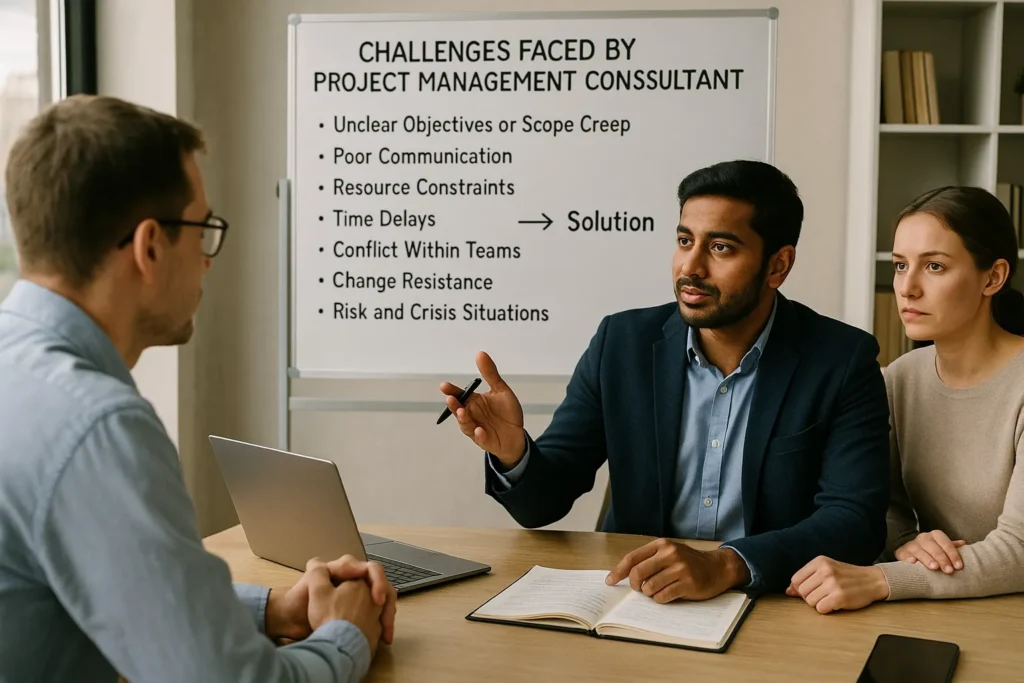
The Need of the Hour
The possibility for error is getting less in the competitive environment of today. Consumers want prompt delivery; investors want efficiency; and rules call for compliance. Under such a context, mismanaging projects comes with too great expenses. By developing internal competencies and raising general project maturity, project management consultants not only assist companies to reach project success but also support long-term organizational development.
Conclusion
The position of a Project Management Consultant is no more optional in a time when companies deal with ever rising complexity and competitiveness. It is rather necessary. From guaranteeing ROI and cost control to risk reduction and innovative driving force, PMCs enable companies to change project delivery and reach sustained success.
Investing in competent project management advice not only raises their chances of project success but also strengthens, more resilient operations ready to face upcoming difficulties. The instance of ABC Tech shows how timely involvement of a consultant may turn around even difficult projects, producing value much beyond the advisory cost.

Nice deatiling. This article cover alot of details that really worth to read.
Thank you so much for your kind words! We’re really glad to hear that you found the article detailed and worth reading. Your feedback motivates us to keep sharing more valuable insights. Stay tuned for more content coming soon!